Mohammed Khalil Ibrahim
Professor and Head of Aerodynamics Group
Faculty of Engineering, Aerospace Engineering Department, Cairo University, Giza 12613, Egypt (email)
Faculty of Engineering, Aerospace Engineering Department, Cairo University, Giza 12613, Egypt (email)

In December 2002, the United Nations General Assembly adopted resolution 57/254 to put in place a United Nations Decade of Education for Sustainable Development (DESD), spanning from 2005 to 2014. The basic vision of the DESD is a world where everyone has the opportunity to benefit from education and learn the values, behaviors and lifestyles required for a sustainable future and for positive societal transformation. Space Technologies contribute significantly to wealth creation and quality of life, both directly and in terms of technology spin-off to other sectors. Increasing number of citizens involved in space education and related work (cutting edge technology) is of paramount importance for the benefit and wealth of world’s people. Recent developments in availability and extensive use of very small size spacecraft (CanSat and CubeSats) is opened space technology and education to almost everyone.
CanSat Leader Training Program (CLTP) Can-Sat activates in Japan have been developing for more than ten years. A Rocket Launch for International Students Satellites (ARLISS) is held in Black Rock Desert, Nevada, USA and students from all over the world have been attending this competition since 1999. Several Japanese universities are participating actively each year in ARLISS.
The concept is very attractive and challenging to the undergraduate students and it contributes to the teaching method of space engineering education. Spreading this concept to the world becomes one of the main activities of Japanese University Space Engineering Consortium (UNISEC). UNISEC is a non-profitable organization to support practical space development activities in universities and colleges, such as small satellite and hybrid rockets.
The first Can-Sat Leader Training Program (CLTP) has been held in Japan from February 14 to March 14, 2011. The program was organized by Institute for Education on Space (IfES) at Wakayama University in Wakayama prefecture and University Space Engineering Consortium (UNISEC). The program is sponsored by several Japanese ministries and organizations and it is dedicated for researches and faculties in the field space engineering to learn the basic concept and knowhow of space engineering and experience practical hand-on training. Twelve participants from ten different counties were participating in the first CLTP. The ten countries are Turkey, Mexico, Guatemala, Peru, Sri-Lanka, Australia, Nigeria, Algeria, Vietnam and Egypt. Dr. Mohammed Khalil Ibrahim had participated in this program from Egypt. The mission was clear for all participants, leaders who are able is to transfer the gained experience during CLTP to both undergraduate and graduate students at their own countries and introduce the Can-Sat based space education at their institute.
The Third CLTP was held in Japan from July 17 to August 20, 2012 at Tokyo Metropolitan University, Hino, Tokyo, Japan. To faculty members from Aerospace Engineering Departments were attend this course, Dr. Ayman Hamdy Kassem and Dr. Ahmed Rashed.

Launching our first made CanSat during CLTP1 in Japan, 2011

Hands-on training during CLTP1, Wakayama University, Japan, 2011

All Participants of CLTP1

CLTP Certificate of Completeion of Dr. Mohammed Khalil Ibrahim

Dr. Ayman Hamdy Kassem and Dr. Ahmed Rashed Launching thier CanSat duirng CLTP3
The first Egyptian space science and technology educational project based on CLTP is named Can-Sat Training Program (CTP) and it held at the Aerospace Engineering Department at Cairo University for undergraduate students as part of the extracurricular activities. The first course of this program (CTP1) was held for two weeks from July 16 to July 31, 2011. Followed this very successful CTP1 series of CTPs were held namely, CTP2 in January 2012, CTP3 in November 2013 and CTP4 in March 2014.

Flier of CTP1 held at Cairo University
|
|
|
| CTP1 | CTP2 |
|
|
|
| CTP3 | CTP4 |
On August 2011 after the Completion of CTP1 Aerospace Engineering Department decided to establish the Space Systems Technology Laboratory. The Laboratory is run and managed by students with faculty supervision. It main objective is for capacity building in space engineering field for Egyptian society. The first president of SSTLAB is Eng. Samy. M. Amin (2011-2012), Eng. Mohamed Abdel Rabie was the second president (2012-2013) and Eng. Ashraf Nabil was the third president (2013-2014).
Sample of Space System Technology Laboratory Activities and Projects
There are many projects and training courses running in SSTLAB, which include but not limited to:
These projects are part of the student graduation requirement and few projects as extracurricular activities
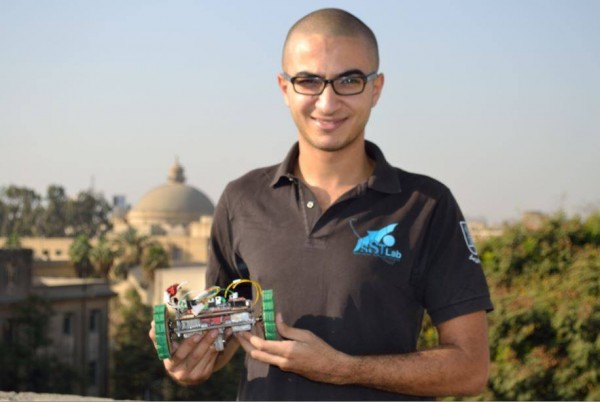 |
|
| Rover-Back Project, 2013-2014 | CubeSat Project, 2012-2013 |

Dr. Nader Mohamed Aboul-Fettouh and Dr. Mohammed Khalil Ibrahim, SSTLAB Founders
 |
|
 |
| Eng. Samy Amin, 1st President and Co-Founder | Eng. Mohamed Adel Rabie, 2nd President and Co-Founder | Eng. Ashraf Nabil, 3rd President and Co-Founder |
 |
 |
| Eng. Hassan Aly, Co-Founder | Eng. Tarek Naiem, Co-Founder |
 |
 |
| SSTLAB Logo | SSTLAB Slogan |
 |
|
Outreach activities of Eng. Samy Amin during his service period
SSTLAB won several national and international competition and gained many awards, These awards include.

Some of SSTLAB Awards
|
|
|
| The best mechanical engineering project in the annual Egyptian Engineering Day, 2011. | The best student paper Competition during American University in Cairo Research Conference, Entrepreneurship and innovation: Shaping the Future of Egypt. 2012 |
|
|
|
| The best mechanical engineering project in the annual Egyptian Engineering Day, 2012. | The best computer-engineering project in the annual Egyptian Engineering Day, 2013. |
|
|
|
| Iran CanSat International Competition, 7th Place, 2013 | Certificate of appreciation for the contrbution to the 1st UNISEC-Global Meeting, Japan 2013 |
|
|
|
| 1st Place in Pre-Mission Idea Contest, Japan, 2013 | University Rover Challenge Competition, USA, 9th Place, 2014 |
University Space Engineering Consortium (UNISEC) UNISEC is a non-profitable organization (NPO) to support practical space development activities in universities and colleges, such as small satellite and hybrid rockets. In April 2002, two organizations “UNISAT (University Satellite Consortium)" and "Hybrid rocket group" in Japan merged and obtained corporate status, for more effective and sustainable activities. Please find attached herewith more information about UNISEC
UNISEC established mainly to contribute to the following subjects:
The three pillars of UNISEC are:
On July 4, 2012 a meeting about establishing University Space Engineering Consortium in Egypt was conducted to discuss the possibility of establishing UNISEC-Egypt. Twenty-nine participants attended the meeting from 12 universities/research centers/institutes/agencies. The meeting was moderated and organized by the staff members of the Space Systems Technology Laboratory (SSTLab) at Aerospace Engineering Department, Faculty of Engineering, Egypt. During the meeting, both UNISEC and SSTLAB activities were introduced with self-introduction from all participants. Participants agreed to hold a second general meeting in 2013 or 2014 (it will be announced later though the mailing list). In this meeting also each interested university/institute/research center will present its potential and contribution to the field of space engineering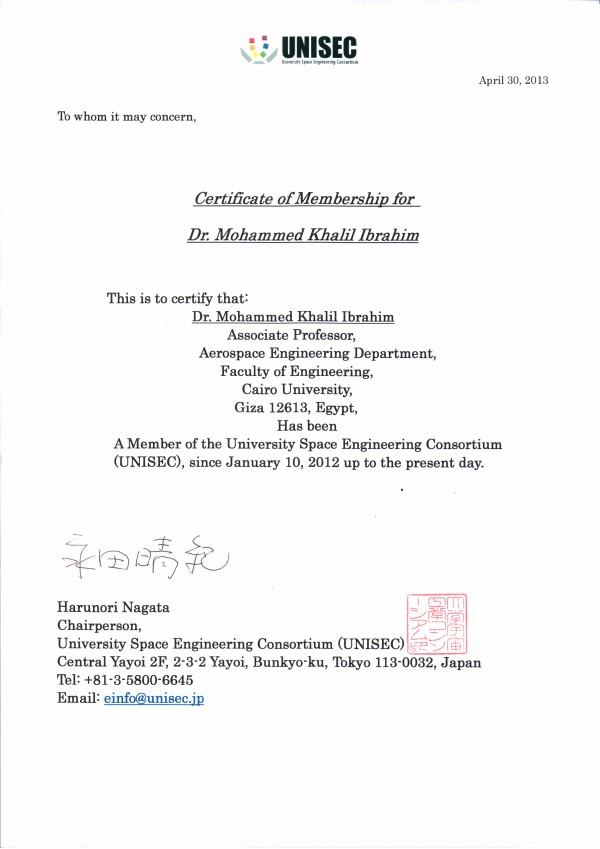
UNISEC Membership Certificate of Dr. Mohammed Khalil Ibrahim
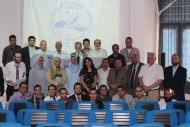 |
|
| 1st Unisec-Egypt Meeting | Japanese Delegation made opening speach during 1st UNSEC-Egypt Meeting |
The Mission Idea Contest (MIC) was established last year to provide aerospace engineers, college students, consultants, and anybody interested in space with opportunities to present their creative ideas and gain attention internationally. The primary goal of MICs is to open a door to a new facet of space exploration and exploitation. Development of micro/nano-satellites started as an educational and research program primarily at university laboratories. As the micro/nano-satellite technology matures, it have spread rapidly across the academics and industry for practical application. The first Mission Idea Contest (MIC1) was started in mid 2010 and organized by UNISEC, Axelspace Corporation and the University of Tokyo. MIC1 focused mainly on mission idea and satellite design for of nano-satellite constellation. For more details about this contest the reader is encouraged to read reference.
In The 2nd Mission Idea Contest (MIC2), organized by UNISEC and the University of Tokyo, calls for ideas in two categories: 1) Mission idea and Satellite Design Category or Category 1 and 2) Business Model category of Category 2. Third Mission Idea Contest is scheduled in November 2013.Several seminar were conducted to encourage student and engineers to participate.
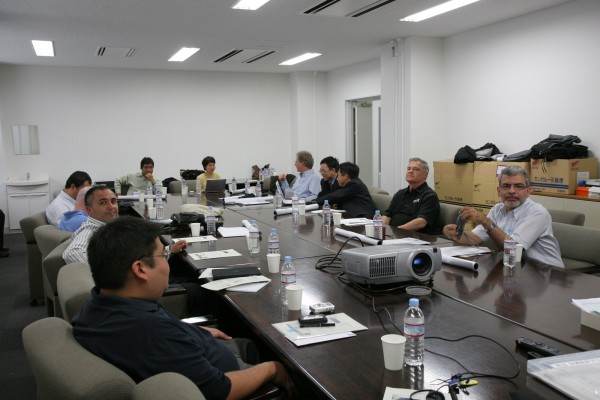
First Mission Idea Contest Coordinator's Meeting in Japan, 2010
|
|
|
| 1st Mission Idea Contest Seminar, 2010 | 2nd Mission Idea Contest Seminar, 2012 |
|
|
|
| Certificate of participation in Mission Idea Contest | Coordinator Apprintement Letter in Mission idea Contest |
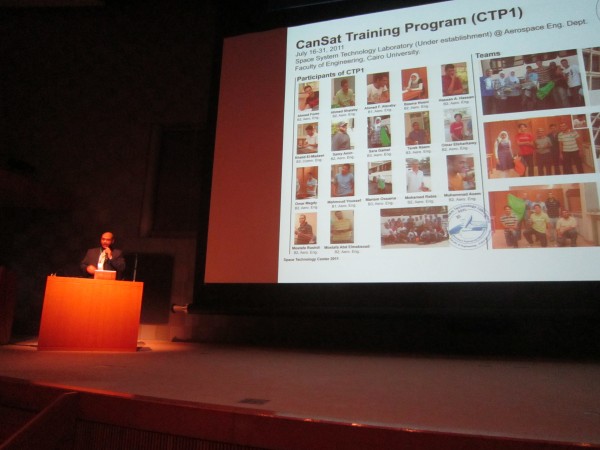
Eng. Samy M. Amin Presentation during 3rd Nano-satellite symposium in Kyushu, Japan, 2011